Analyzing Employee Motivation, Work Experience, and Job Security
VerifiedAdded on 2022/12/07
|8
|1987
|272
Report
AI Summary
This report delves into the multifaceted reasons behind why individuals engage in work, examining the crucial factors that drive employee motivation and shape their experiences within an organization. The report meticulously explores various motivational elements, including financial rewards, personal satisfaction, recognition, quality of work life, organizational culture, job security, career development opportunities, and fair wages. Furthermore, it dissects both positive and negative aspects of the work environment, such as rewards, interpersonal relationships, supportive colleagues, company policies, job stress, and the nature of work. The report concludes by emphasizing the significance of employee motivation in enhancing overall organizational performance and productivity, while also acknowledging the potential negative impacts that can arise from adverse workplace conditions.
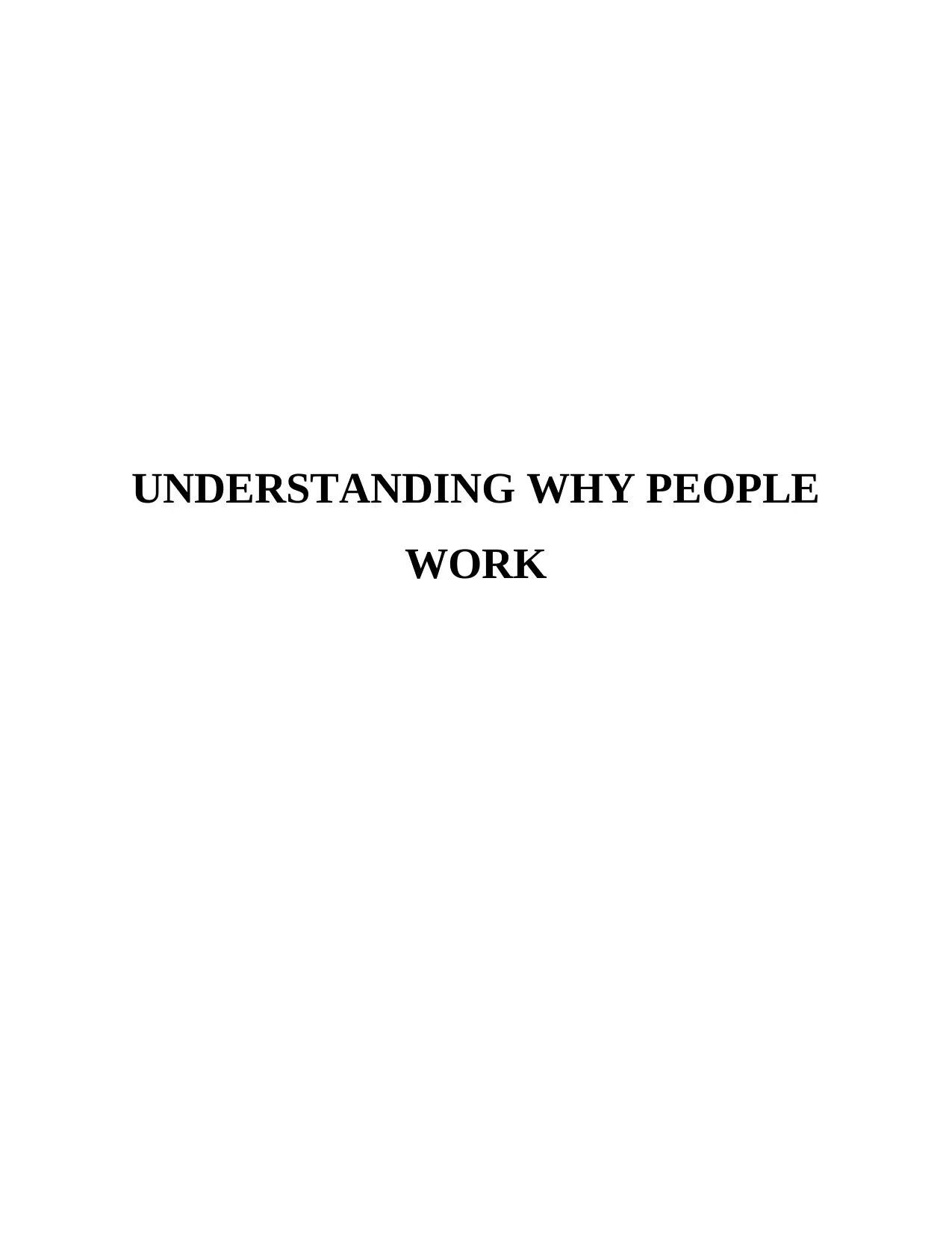
UNDERSTANDING WHY PEOPLE
WORK
WORK
Paraphrase This Document
Need a fresh take? Get an instant paraphrase of this document with our AI Paraphraser
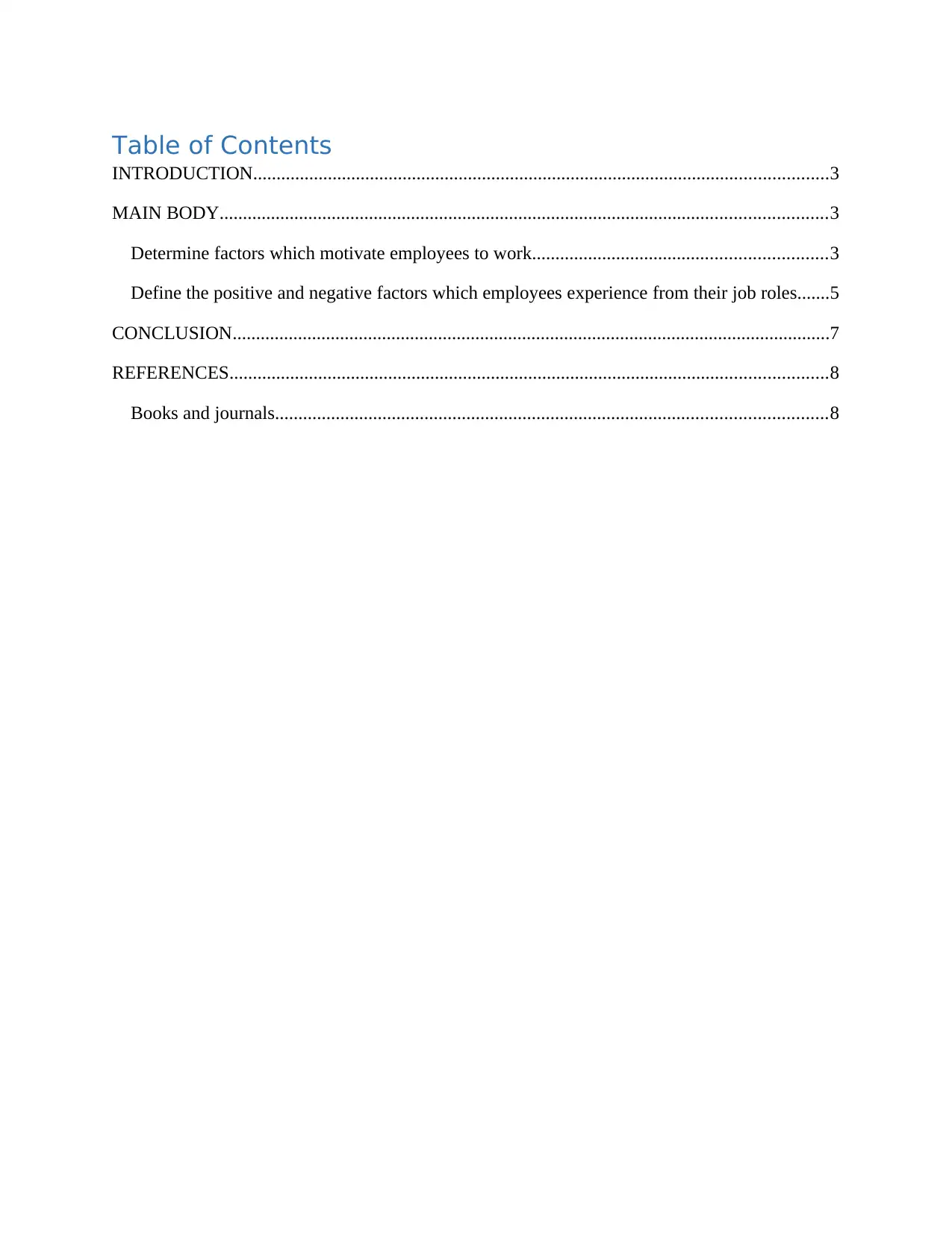
Table of Contents
INTRODUCTION...........................................................................................................................3
MAIN BODY..................................................................................................................................3
Determine factors which motivate employees to work...............................................................3
Define the positive and negative factors which employees experience from their job roles.......5
CONCLUSION................................................................................................................................7
REFERENCES................................................................................................................................8
Books and journals......................................................................................................................8
INTRODUCTION...........................................................................................................................3
MAIN BODY..................................................................................................................................3
Determine factors which motivate employees to work...............................................................3
Define the positive and negative factors which employees experience from their job roles.......5
CONCLUSION................................................................................................................................7
REFERENCES................................................................................................................................8
Books and journals......................................................................................................................8
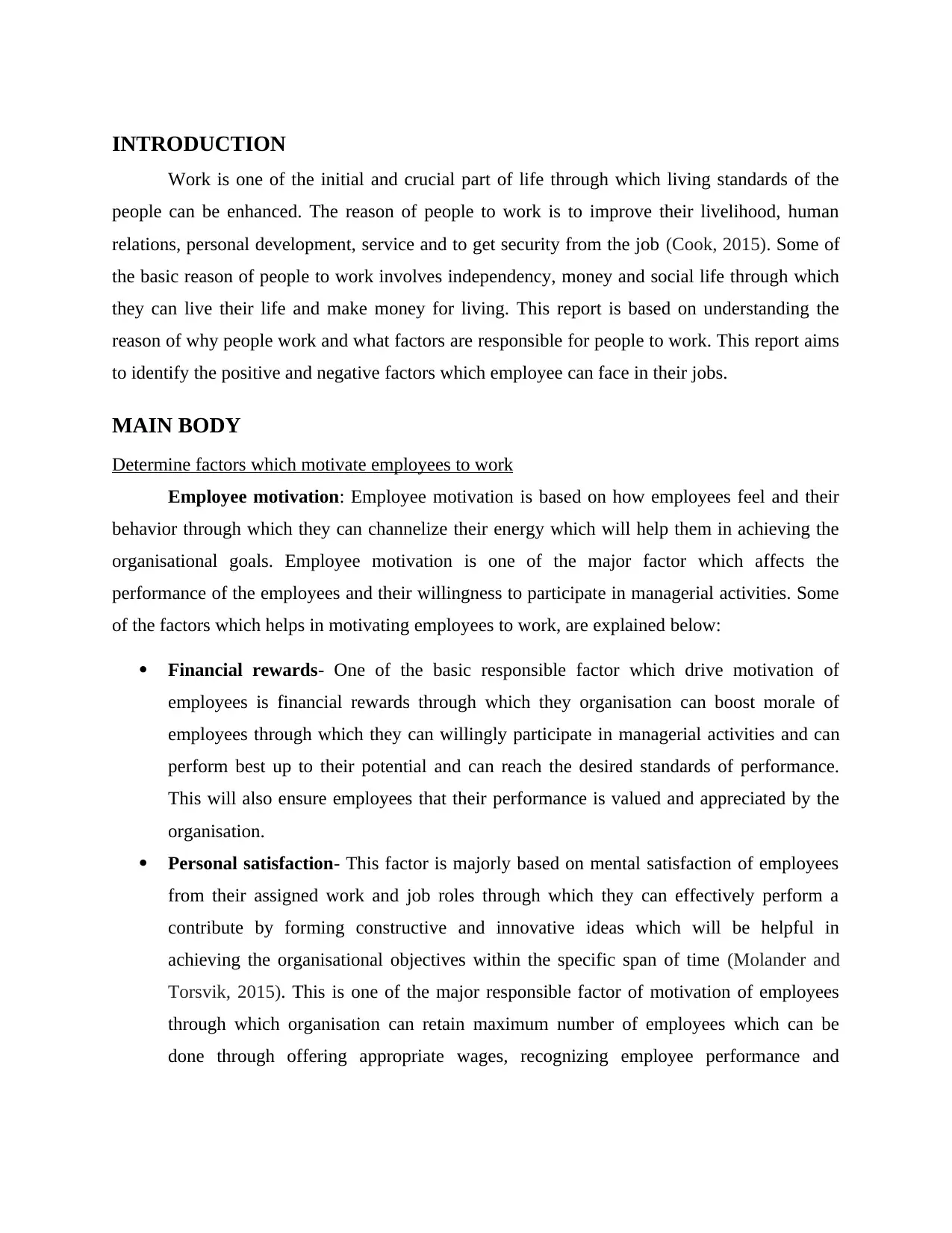
INTRODUCTION
Work is one of the initial and crucial part of life through which living standards of the
people can be enhanced. The reason of people to work is to improve their livelihood, human
relations, personal development, service and to get security from the job (Cook, 2015). Some of
the basic reason of people to work involves independency, money and social life through which
they can live their life and make money for living. This report is based on understanding the
reason of why people work and what factors are responsible for people to work. This report aims
to identify the positive and negative factors which employee can face in their jobs.
MAIN BODY
Determine factors which motivate employees to work
Employee motivation: Employee motivation is based on how employees feel and their
behavior through which they can channelize their energy which will help them in achieving the
organisational goals. Employee motivation is one of the major factor which affects the
performance of the employees and their willingness to participate in managerial activities. Some
of the factors which helps in motivating employees to work, are explained below:
Financial rewards- One of the basic responsible factor which drive motivation of
employees is financial rewards through which they organisation can boost morale of
employees through which they can willingly participate in managerial activities and can
perform best up to their potential and can reach the desired standards of performance.
This will also ensure employees that their performance is valued and appreciated by the
organisation.
Personal satisfaction- This factor is majorly based on mental satisfaction of employees
from their assigned work and job roles through which they can effectively perform a
contribute by forming constructive and innovative ideas which will be helpful in
achieving the organisational objectives within the specific span of time (Molander and
Torsvik, 2015). This is one of the major responsible factor of motivation of employees
through which organisation can retain maximum number of employees which can be
done through offering appropriate wages, recognizing employee performance and
Work is one of the initial and crucial part of life through which living standards of the
people can be enhanced. The reason of people to work is to improve their livelihood, human
relations, personal development, service and to get security from the job (Cook, 2015). Some of
the basic reason of people to work involves independency, money and social life through which
they can live their life and make money for living. This report is based on understanding the
reason of why people work and what factors are responsible for people to work. This report aims
to identify the positive and negative factors which employee can face in their jobs.
MAIN BODY
Determine factors which motivate employees to work
Employee motivation: Employee motivation is based on how employees feel and their
behavior through which they can channelize their energy which will help them in achieving the
organisational goals. Employee motivation is one of the major factor which affects the
performance of the employees and their willingness to participate in managerial activities. Some
of the factors which helps in motivating employees to work, are explained below:
Financial rewards- One of the basic responsible factor which drive motivation of
employees is financial rewards through which they organisation can boost morale of
employees through which they can willingly participate in managerial activities and can
perform best up to their potential and can reach the desired standards of performance.
This will also ensure employees that their performance is valued and appreciated by the
organisation.
Personal satisfaction- This factor is majorly based on mental satisfaction of employees
from their assigned work and job roles through which they can effectively perform a
contribute by forming constructive and innovative ideas which will be helpful in
achieving the organisational objectives within the specific span of time (Molander and
Torsvik, 2015). This is one of the major responsible factor of motivation of employees
through which organisation can retain maximum number of employees which can be
done through offering appropriate wages, recognizing employee performance and
⊘ This is a preview!⊘
Do you want full access?
Subscribe today to unlock all pages.

Trusted by 1+ million students worldwide
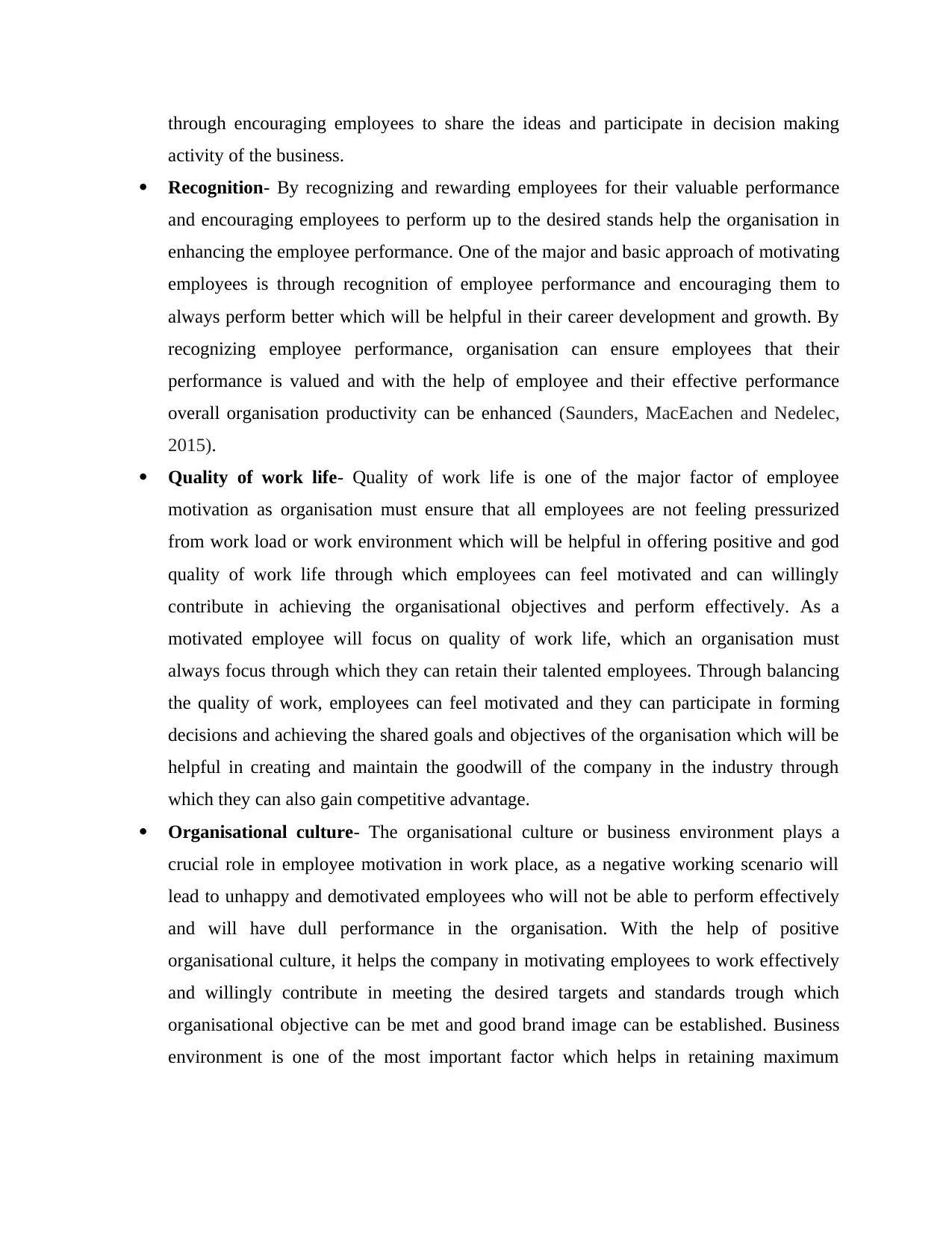
through encouraging employees to share the ideas and participate in decision making
activity of the business.
Recognition- By recognizing and rewarding employees for their valuable performance
and encouraging employees to perform up to the desired stands help the organisation in
enhancing the employee performance. One of the major and basic approach of motivating
employees is through recognition of employee performance and encouraging them to
always perform better which will be helpful in their career development and growth. By
recognizing employee performance, organisation can ensure employees that their
performance is valued and with the help of employee and their effective performance
overall organisation productivity can be enhanced (Saunders, MacEachen and Nedelec,
2015).
Quality of work life- Quality of work life is one of the major factor of employee
motivation as organisation must ensure that all employees are not feeling pressurized
from work load or work environment which will be helpful in offering positive and god
quality of work life through which employees can feel motivated and can willingly
contribute in achieving the organisational objectives and perform effectively. As a
motivated employee will focus on quality of work life, which an organisation must
always focus through which they can retain their talented employees. Through balancing
the quality of work, employees can feel motivated and they can participate in forming
decisions and achieving the shared goals and objectives of the organisation which will be
helpful in creating and maintain the goodwill of the company in the industry through
which they can also gain competitive advantage.
Organisational culture- The organisational culture or business environment plays a
crucial role in employee motivation in work place, as a negative working scenario will
lead to unhappy and demotivated employees who will not be able to perform effectively
and will have dull performance in the organisation. With the help of positive
organisational culture, it helps the company in motivating employees to work effectively
and willingly contribute in meeting the desired targets and standards trough which
organisational objective can be met and good brand image can be established. Business
environment is one of the most important factor which helps in retaining maximum
activity of the business.
Recognition- By recognizing and rewarding employees for their valuable performance
and encouraging employees to perform up to the desired stands help the organisation in
enhancing the employee performance. One of the major and basic approach of motivating
employees is through recognition of employee performance and encouraging them to
always perform better which will be helpful in their career development and growth. By
recognizing employee performance, organisation can ensure employees that their
performance is valued and with the help of employee and their effective performance
overall organisation productivity can be enhanced (Saunders, MacEachen and Nedelec,
2015).
Quality of work life- Quality of work life is one of the major factor of employee
motivation as organisation must ensure that all employees are not feeling pressurized
from work load or work environment which will be helpful in offering positive and god
quality of work life through which employees can feel motivated and can willingly
contribute in achieving the organisational objectives and perform effectively. As a
motivated employee will focus on quality of work life, which an organisation must
always focus through which they can retain their talented employees. Through balancing
the quality of work, employees can feel motivated and they can participate in forming
decisions and achieving the shared goals and objectives of the organisation which will be
helpful in creating and maintain the goodwill of the company in the industry through
which they can also gain competitive advantage.
Organisational culture- The organisational culture or business environment plays a
crucial role in employee motivation in work place, as a negative working scenario will
lead to unhappy and demotivated employees who will not be able to perform effectively
and will have dull performance in the organisation. With the help of positive
organisational culture, it helps the company in motivating employees to work effectively
and willingly contribute in meeting the desired targets and standards trough which
organisational objective can be met and good brand image can be established. Business
environment is one of the most important factor which helps in retaining maximum
Paraphrase This Document
Need a fresh take? Get an instant paraphrase of this document with our AI Paraphraser
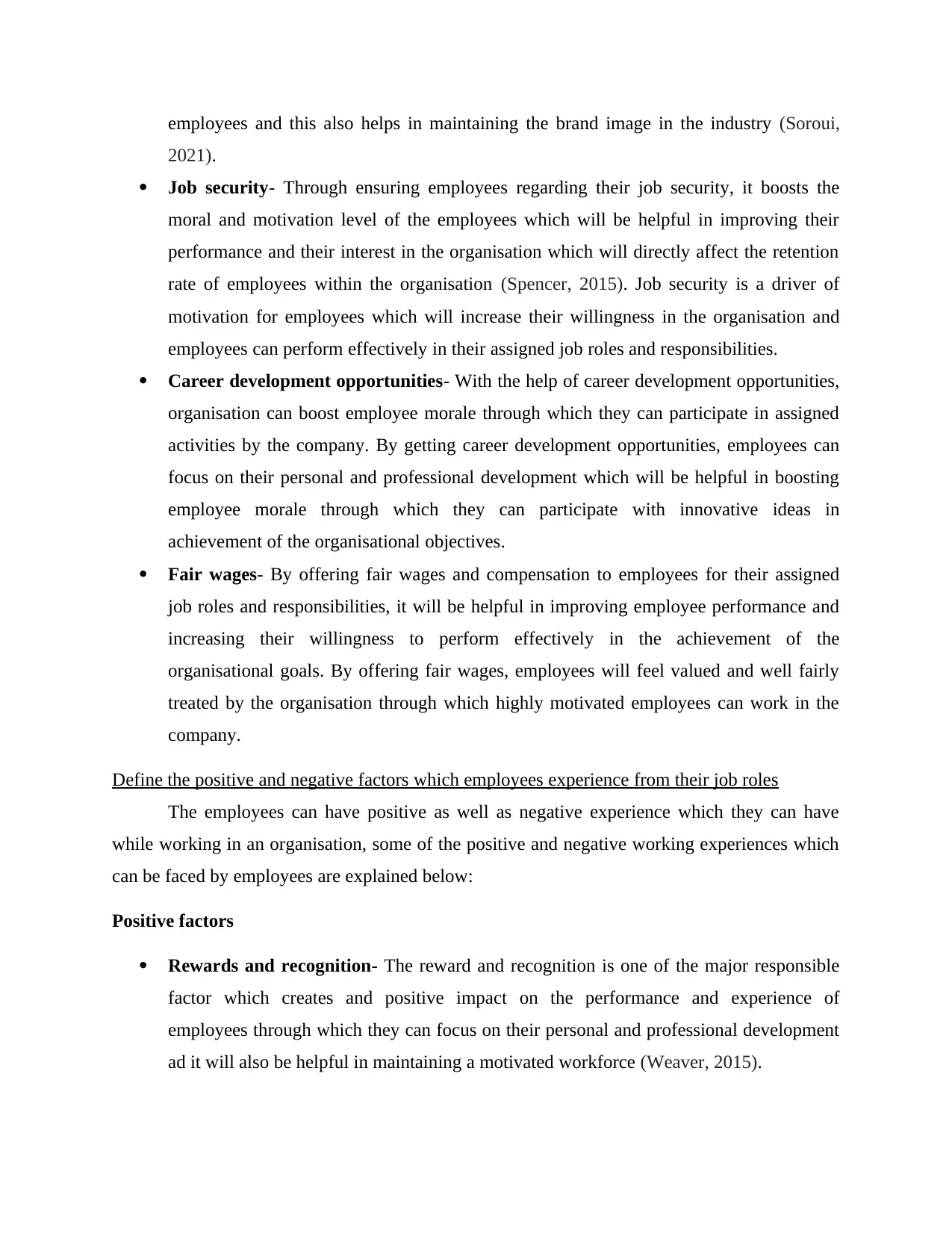
employees and this also helps in maintaining the brand image in the industry (Soroui,
2021).
Job security- Through ensuring employees regarding their job security, it boosts the
moral and motivation level of the employees which will be helpful in improving their
performance and their interest in the organisation which will directly affect the retention
rate of employees within the organisation (Spencer, 2015). Job security is a driver of
motivation for employees which will increase their willingness in the organisation and
employees can perform effectively in their assigned job roles and responsibilities.
Career development opportunities- With the help of career development opportunities,
organisation can boost employee morale through which they can participate in assigned
activities by the company. By getting career development opportunities, employees can
focus on their personal and professional development which will be helpful in boosting
employee morale through which they can participate with innovative ideas in
achievement of the organisational objectives.
Fair wages- By offering fair wages and compensation to employees for their assigned
job roles and responsibilities, it will be helpful in improving employee performance and
increasing their willingness to perform effectively in the achievement of the
organisational goals. By offering fair wages, employees will feel valued and well fairly
treated by the organisation through which highly motivated employees can work in the
company.
Define the positive and negative factors which employees experience from their job roles
The employees can have positive as well as negative experience which they can have
while working in an organisation, some of the positive and negative working experiences which
can be faced by employees are explained below:
Positive factors
Rewards and recognition- The reward and recognition is one of the major responsible
factor which creates and positive impact on the performance and experience of
employees through which they can focus on their personal and professional development
ad it will also be helpful in maintaining a motivated workforce (Weaver, 2015).
2021).
Job security- Through ensuring employees regarding their job security, it boosts the
moral and motivation level of the employees which will be helpful in improving their
performance and their interest in the organisation which will directly affect the retention
rate of employees within the organisation (Spencer, 2015). Job security is a driver of
motivation for employees which will increase their willingness in the organisation and
employees can perform effectively in their assigned job roles and responsibilities.
Career development opportunities- With the help of career development opportunities,
organisation can boost employee morale through which they can participate in assigned
activities by the company. By getting career development opportunities, employees can
focus on their personal and professional development which will be helpful in boosting
employee morale through which they can participate with innovative ideas in
achievement of the organisational objectives.
Fair wages- By offering fair wages and compensation to employees for their assigned
job roles and responsibilities, it will be helpful in improving employee performance and
increasing their willingness to perform effectively in the achievement of the
organisational goals. By offering fair wages, employees will feel valued and well fairly
treated by the organisation through which highly motivated employees can work in the
company.
Define the positive and negative factors which employees experience from their job roles
The employees can have positive as well as negative experience which they can have
while working in an organisation, some of the positive and negative working experiences which
can be faced by employees are explained below:
Positive factors
Rewards and recognition- The reward and recognition is one of the major responsible
factor which creates and positive impact on the performance and experience of
employees through which they can focus on their personal and professional development
ad it will also be helpful in maintaining a motivated workforce (Weaver, 2015).
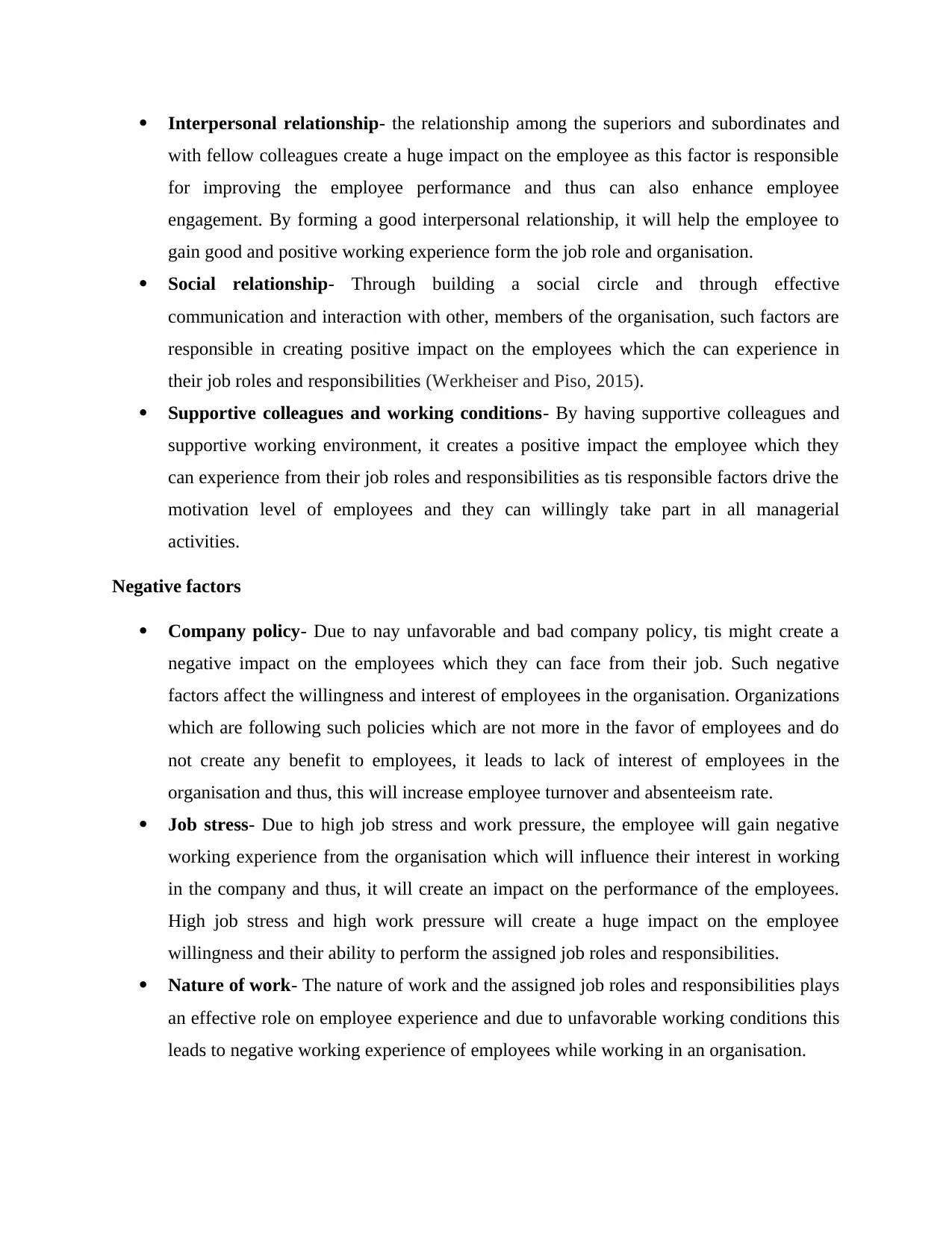
Interpersonal relationship- the relationship among the superiors and subordinates and
with fellow colleagues create a huge impact on the employee as this factor is responsible
for improving the employee performance and thus can also enhance employee
engagement. By forming a good interpersonal relationship, it will help the employee to
gain good and positive working experience form the job role and organisation.
Social relationship- Through building a social circle and through effective
communication and interaction with other, members of the organisation, such factors are
responsible in creating positive impact on the employees which the can experience in
their job roles and responsibilities (Werkheiser and Piso, 2015).
Supportive colleagues and working conditions- By having supportive colleagues and
supportive working environment, it creates a positive impact the employee which they
can experience from their job roles and responsibilities as tis responsible factors drive the
motivation level of employees and they can willingly take part in all managerial
activities.
Negative factors
Company policy- Due to nay unfavorable and bad company policy, tis might create a
negative impact on the employees which they can face from their job. Such negative
factors affect the willingness and interest of employees in the organisation. Organizations
which are following such policies which are not more in the favor of employees and do
not create any benefit to employees, it leads to lack of interest of employees in the
organisation and thus, this will increase employee turnover and absenteeism rate.
Job stress- Due to high job stress and work pressure, the employee will gain negative
working experience from the organisation which will influence their interest in working
in the company and thus, it will create an impact on the performance of the employees.
High job stress and high work pressure will create a huge impact on the employee
willingness and their ability to perform the assigned job roles and responsibilities.
Nature of work- The nature of work and the assigned job roles and responsibilities plays
an effective role on employee experience and due to unfavorable working conditions this
leads to negative working experience of employees while working in an organisation.
with fellow colleagues create a huge impact on the employee as this factor is responsible
for improving the employee performance and thus can also enhance employee
engagement. By forming a good interpersonal relationship, it will help the employee to
gain good and positive working experience form the job role and organisation.
Social relationship- Through building a social circle and through effective
communication and interaction with other, members of the organisation, such factors are
responsible in creating positive impact on the employees which the can experience in
their job roles and responsibilities (Werkheiser and Piso, 2015).
Supportive colleagues and working conditions- By having supportive colleagues and
supportive working environment, it creates a positive impact the employee which they
can experience from their job roles and responsibilities as tis responsible factors drive the
motivation level of employees and they can willingly take part in all managerial
activities.
Negative factors
Company policy- Due to nay unfavorable and bad company policy, tis might create a
negative impact on the employees which they can face from their job. Such negative
factors affect the willingness and interest of employees in the organisation. Organizations
which are following such policies which are not more in the favor of employees and do
not create any benefit to employees, it leads to lack of interest of employees in the
organisation and thus, this will increase employee turnover and absenteeism rate.
Job stress- Due to high job stress and work pressure, the employee will gain negative
working experience from the organisation which will influence their interest in working
in the company and thus, it will create an impact on the performance of the employees.
High job stress and high work pressure will create a huge impact on the employee
willingness and their ability to perform the assigned job roles and responsibilities.
Nature of work- The nature of work and the assigned job roles and responsibilities plays
an effective role on employee experience and due to unfavorable working conditions this
leads to negative working experience of employees while working in an organisation.
⊘ This is a preview!⊘
Do you want full access?
Subscribe today to unlock all pages.

Trusted by 1+ million students worldwide
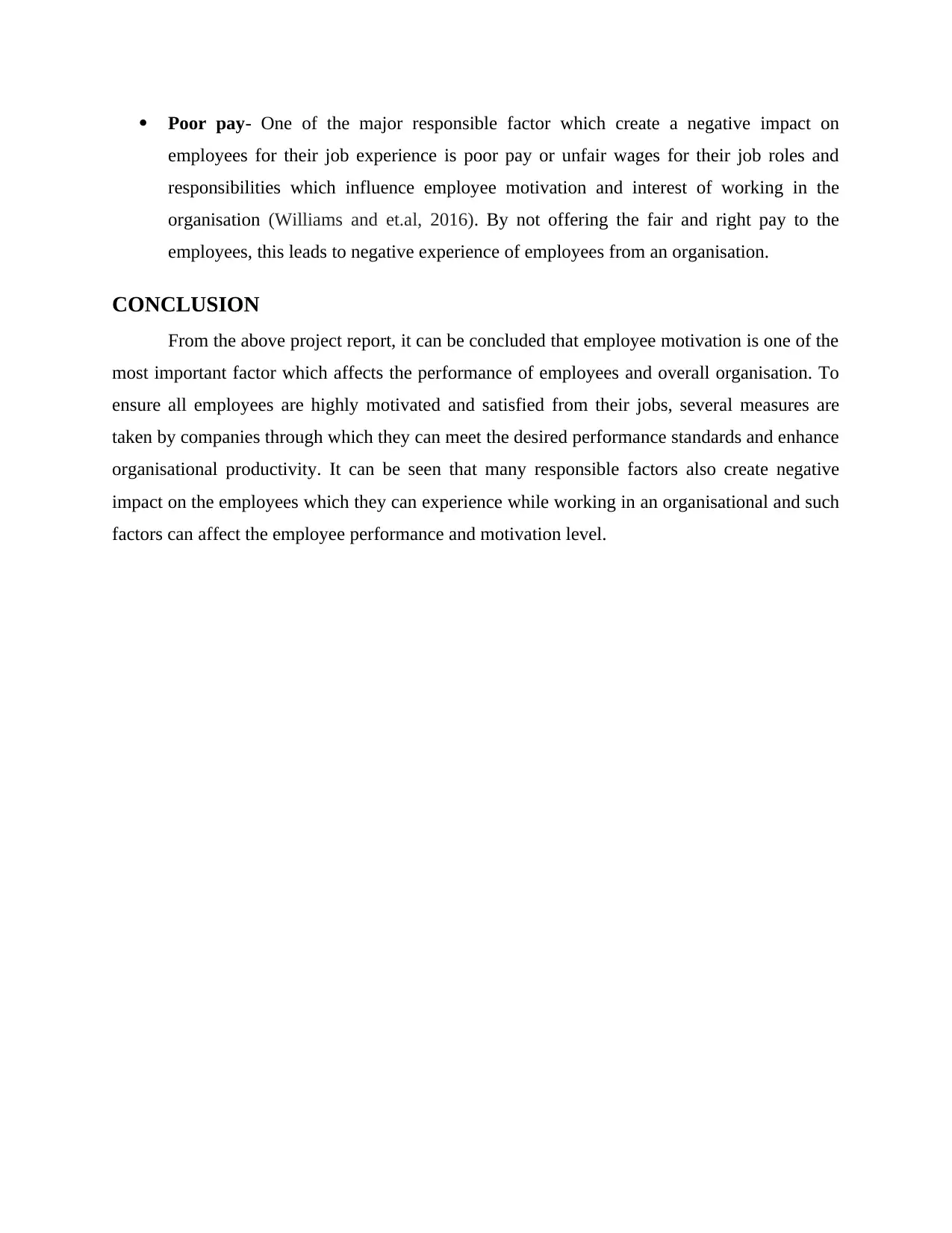
Poor pay- One of the major responsible factor which create a negative impact on
employees for their job experience is poor pay or unfair wages for their job roles and
responsibilities which influence employee motivation and interest of working in the
organisation (Williams and et.al, 2016). By not offering the fair and right pay to the
employees, this leads to negative experience of employees from an organisation.
CONCLUSION
From the above project report, it can be concluded that employee motivation is one of the
most important factor which affects the performance of employees and overall organisation. To
ensure all employees are highly motivated and satisfied from their jobs, several measures are
taken by companies through which they can meet the desired performance standards and enhance
organisational productivity. It can be seen that many responsible factors also create negative
impact on the employees which they can experience while working in an organisational and such
factors can affect the employee performance and motivation level.
employees for their job experience is poor pay or unfair wages for their job roles and
responsibilities which influence employee motivation and interest of working in the
organisation (Williams and et.al, 2016). By not offering the fair and right pay to the
employees, this leads to negative experience of employees from an organisation.
CONCLUSION
From the above project report, it can be concluded that employee motivation is one of the
most important factor which affects the performance of employees and overall organisation. To
ensure all employees are highly motivated and satisfied from their jobs, several measures are
taken by companies through which they can meet the desired performance standards and enhance
organisational productivity. It can be seen that many responsible factors also create negative
impact on the employees which they can experience while working in an organisational and such
factors can affect the employee performance and motivation level.
Paraphrase This Document
Need a fresh take? Get an instant paraphrase of this document with our AI Paraphraser
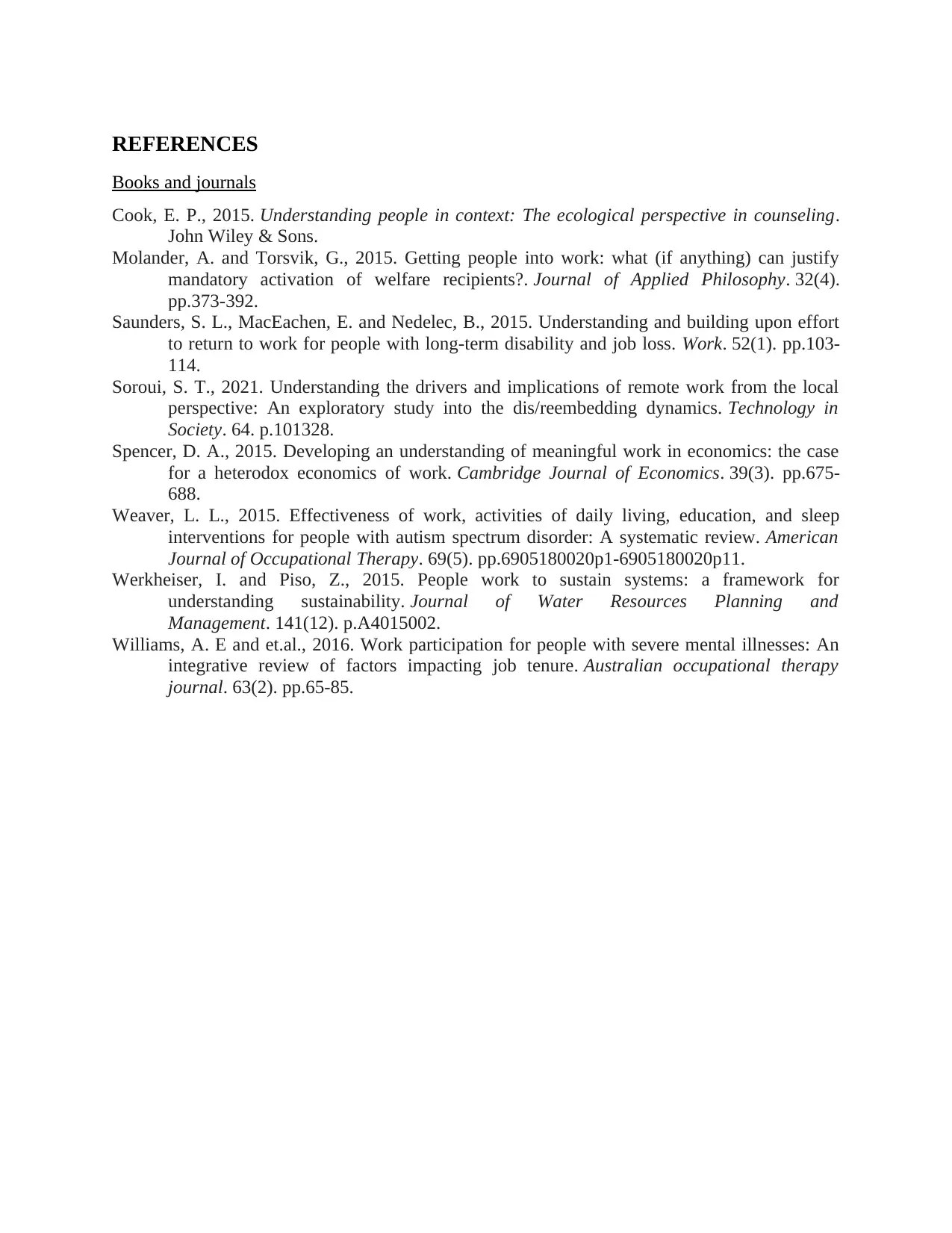
REFERENCES
Books and journals
Cook, E. P., 2015. Understanding people in context: The ecological perspective in counseling.
John Wiley & Sons.
Molander, A. and Torsvik, G., 2015. Getting people into work: what (if anything) can justify
mandatory activation of welfare recipients?. Journal of Applied Philosophy. 32(4).
pp.373-392.
Saunders, S. L., MacEachen, E. and Nedelec, B., 2015. Understanding and building upon effort
to return to work for people with long-term disability and job loss. Work. 52(1). pp.103-
114.
Soroui, S. T., 2021. Understanding the drivers and implications of remote work from the local
perspective: An exploratory study into the dis/reembedding dynamics. Technology in
Society. 64. p.101328.
Spencer, D. A., 2015. Developing an understanding of meaningful work in economics: the case
for a heterodox economics of work. Cambridge Journal of Economics. 39(3). pp.675-
688.
Weaver, L. L., 2015. Effectiveness of work, activities of daily living, education, and sleep
interventions for people with autism spectrum disorder: A systematic review. American
Journal of Occupational Therapy. 69(5). pp.6905180020p1-6905180020p11.
Werkheiser, I. and Piso, Z., 2015. People work to sustain systems: a framework for
understanding sustainability. Journal of Water Resources Planning and
Management. 141(12). p.A4015002.
Williams, A. E and et.al., 2016. Work participation for people with severe mental illnesses: An
integrative review of factors impacting job tenure. Australian occupational therapy
journal. 63(2). pp.65-85.
Books and journals
Cook, E. P., 2015. Understanding people in context: The ecological perspective in counseling.
John Wiley & Sons.
Molander, A. and Torsvik, G., 2015. Getting people into work: what (if anything) can justify
mandatory activation of welfare recipients?. Journal of Applied Philosophy. 32(4).
pp.373-392.
Saunders, S. L., MacEachen, E. and Nedelec, B., 2015. Understanding and building upon effort
to return to work for people with long-term disability and job loss. Work. 52(1). pp.103-
114.
Soroui, S. T., 2021. Understanding the drivers and implications of remote work from the local
perspective: An exploratory study into the dis/reembedding dynamics. Technology in
Society. 64. p.101328.
Spencer, D. A., 2015. Developing an understanding of meaningful work in economics: the case
for a heterodox economics of work. Cambridge Journal of Economics. 39(3). pp.675-
688.
Weaver, L. L., 2015. Effectiveness of work, activities of daily living, education, and sleep
interventions for people with autism spectrum disorder: A systematic review. American
Journal of Occupational Therapy. 69(5). pp.6905180020p1-6905180020p11.
Werkheiser, I. and Piso, Z., 2015. People work to sustain systems: a framework for
understanding sustainability. Journal of Water Resources Planning and
Management. 141(12). p.A4015002.
Williams, A. E and et.al., 2016. Work participation for people with severe mental illnesses: An
integrative review of factors impacting job tenure. Australian occupational therapy
journal. 63(2). pp.65-85.
1 out of 8
Related Documents
Your All-in-One AI-Powered Toolkit for Academic Success.
+13062052269
info@desklib.com
Available 24*7 on WhatsApp / Email
![[object Object]](/_next/static/media/star-bottom.7253800d.svg)
Unlock your academic potential
Copyright © 2020–2025 A2Z Services. All Rights Reserved. Developed and managed by ZUCOL.


